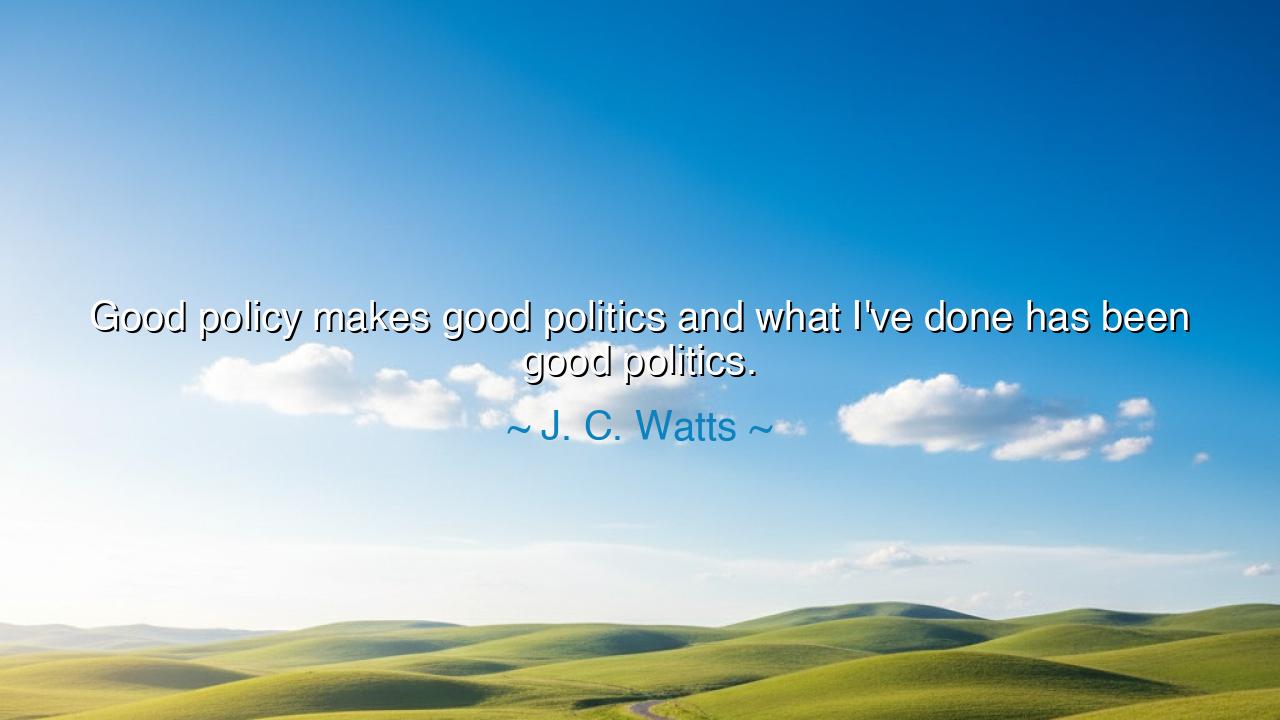
Good policy makes good politics and what I've done has been good






The words of J. C. Watts ring with the cadence of both wisdom and confidence: “Good policy makes good politics, and what I’ve done has been good politics.” In this saying, he reveals a truth too often forgotten—that the noblest path in governance is not to chase applause or empty promises, but to build policies rooted in justice, service, and foresight. When the foundations are righteous, the politics that follows is strengthened, for the people can see the fruit of wise labor.
In the history of nations, those who have governed well often found their reward not in immediate praise, but in the lasting loyalty of their people. Consider Solon of Athens, who reformed the laws of his city, restraining the greed of the rich and relieving the burdens of the poor. His decrees were unpopular to some, but they laid the groundwork for Athenian democracy. Here the truth of Watts’s words shines: good policy became the seed from which strong and enduring politics grew.
Watts himself, a man who rose from the football field to the halls of Congress, understood that true leadership is tested not in speeches but in deeds. By serving his community with practical reforms and focusing on the needs of his people, he demonstrated that good politics is not trickery but the natural result of wise governance. To him, the measure of politics was not the fleeting cheer of the crowd but the long harvest of trust.
Contrast this with leaders who built their politics on falsehoods and shallow gain. Their victories were short-lived, their names forgotten or despised. For bad policy, no matter how gilded in rhetoric, cannot sustain good politics. Just as a house built on sand collapses in the storm, so too does a state falter when policy is crafted for vanity rather than virtue.
So let the children of the future remember: pursue always good policy, for it is the mother of good politics. Empty politics dies with the echo of the crowd, but wise governance endures in the lives of the people. In the realm of statesmanship, the surest path to greatness is not to seek political glory first, but to serve with justice, knowing that the glory will follow as shadow follows the flame.






HYNguyen Thi Hai Yen
J. C. Watts seems to suggest that good politics and good policy should naturally go hand-in-hand. But I wonder how this perspective accounts for the political realities of working with different interests. Could it be that what’s good for one party or group may not be good for another, thus complicating the alignment of policy and politics?
NNHa Nhat Nguyen
It’s interesting that Watts associates good politics with good policy. But how do we define good policy? If a policy works for a certain group but harms others, can it still be considered good? How does this perspective hold up in a society with diverse interests and competing needs?
TNNguyen Tam Nhi
I’m intrigued by Watts’ perspective, but it feels like an idealistic view of politics. In reality, politicians often have to balance principles with the practicalities of winning support. Can there truly be a perfect overlap between effective policy and popular politics, or are compromises always necessary?
MDLe Kieu My Duyen
While it’s reassuring to hear that good policy leads to good politics, it feels overly simplistic. In many cases, politics involves complex power dynamics and strategic maneuvering that may not align with what’s considered 'good' in terms of policy. Can we ever truly measure the 'goodness' of both, or are they more subjective concepts?
DNDung Nguyen
Watts’ statement implies a symbiotic relationship between policy and politics, but I wonder if this is always the case. Are there moments when the pursuit of 'good politics' overshadows the quality of the policy itself? Does the definition of good politics change depending on the audience or political context?